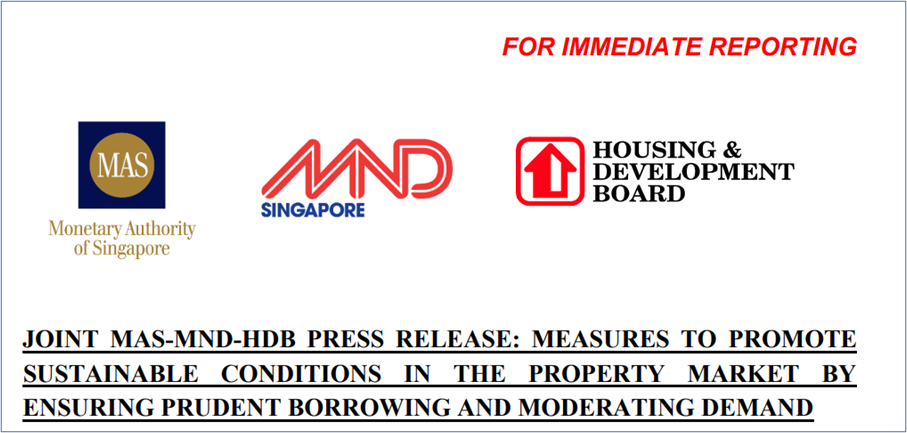The government has introduced a new set of property cooling measures, less than a year from the previous cooling measures released on 16 Dec 2021.
The measures were released jointly by the Monetary Authority of Singapore (MAS), the Ministry of National Development (MND) and HDB and will take effect on 30 September 2022 with immediate effect.
You can read them from the link here or the BT press release [PDF] here.
With that, lets summarize all these into 3 quick things to know about the cooling measures in layman terms.
1. Higher 0.5% Interest Rate Floor
MAS will raise by 0.5% percentage points for the medium-term interest rate floor used by private financial institutions to compute a borrower’s TDSR and MSR.
The revised medium-term interest rates are:
This mainly applies to the mortgage equity withdrawal loans (MWLs) – loans secured against the value of the borrower’s residential property.
This is not to be confused with the actual interest rates charged for mortgages as they will continue to be determined by the private financial institutions.
TLDR: When Financial Institutions (i.e. DBS or UOB) calculate a borrower’s monthly property loan instalments, they are required to use the higher of the medium-term interest rate floor and the thereafter interest rate. This just means the maximum loan amount will be reduced accordingly.
2. Reduced LTV for HDB loans
HDB will introduce an interest rate floor of 3% for computing the eligible loan amount and will apply for an HDB Loan Eligibility (HLE) letters received after 30 Sep 2022, 00:00 hours.
*Note* – This will not affect the actual HDB concessionary interest rate, which will remain unchanged at 2.6% p.a. It will only mean your maximum HDB loan may be reduced accordingly.
On top of that, the Loan-to-Value (LTV) limit for HDB housing loans will be cut from 85% to 80% from 30 Sep 2022 onwards. This means you can loan up to 80% of the purchase price/property value.
An example is where you are buying the $1 million HDB flat, you can only borrow $800,000 and have to fork out $200,000 in downpayment – either by cash and/or CPF OA.
The revised LTV limit does not apply to loans granted by private financial institutions, for which the LTV limit remains at 75%.
3. Longer Wait-out Periods for ‘HDB Downgraders’
Previously, private property owners are able to buy a HDB resale flat when they sell their private properties within 6 months of the HDB flat purchase.
In order to further moderate demand in the HDB resale market, the government will impose a wait-out period of 15 months for private residential property owners as well as former private property owners to buy a non-subsidised HDB resale flat.
The new requirement is “a temporary measure which will be reviewed in future depending on overall market conditions and housing demand”.
The wait-out period will be exempted for seniors aged 55 and above who are downgrading from a private property to a 4-room or smaller resale flat.
Summary
All in all, it is very clear that the Singapore Government is taking additional steps to ensure prudent borrowing and avoid future difficulties in servicing home loans.
They are of the view that market interest rates have risen significantly. Many banks have suspended their fixed rate loan packages and going for floating loans pegged to SORA + X% as seen in the table below.
Despite interest rates expected to increase further, the government is still seeing many million-dollar HDB flats changing hands. This is perhaps the last straw behind the new cooling measures such as tightening the maximum loan quantum limits and ridiculously long (temporary) wait-out periods for downgraders.
Property Market Winners and Losers
In my personal opinion, the impact of the cooling measures is not that severe as the TDSR and MSR remains unchanged at 55% and 30% respectively.
They are targeted to reduce the ‘red-hot’ property prices so that people are not overly stretching their limits. Another reason is probably to tell the public that the government is constantly monitoring the property market as well.
Check out our Youtube Short here (Pls Help to Like & Subscribe to our channel!):
Hence, the obvious losers here will be the property developers i.e. City Developments, UOL, Oxley, GuocoLand because they probably have to reduce their sky-high prices (ahem – AMO Residences) or face lower sales volume in future.
In turn, property agencies like Apac Realty (ERA) and Propnex may see some impact as well due to the long wait-out periods.
A stable property market will benefit the financial institutions such as DBS, UOB, OCBC and even Singapura Finance because they will make more $$ from floating + higher interest rates provided that there are not too many property defaults like China (ouch!).
Lastly, there is likely a muted impact on construction firms like Lian Beng, Chip Eng Seng, Hock Lian Seng since lower residential building demand will be replaced by higher public sector and commercial building demand as hotels and attractions undergo refurbishment to prepare for inbound tourism revival and asset enhancement.



